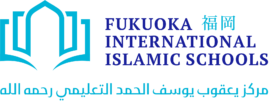Programs
FIIS offers the American Curriculum, which follows the Common Core State Standards (CCSS) for all grades (K-12), ensuring a consistent and rigorous educational framework.

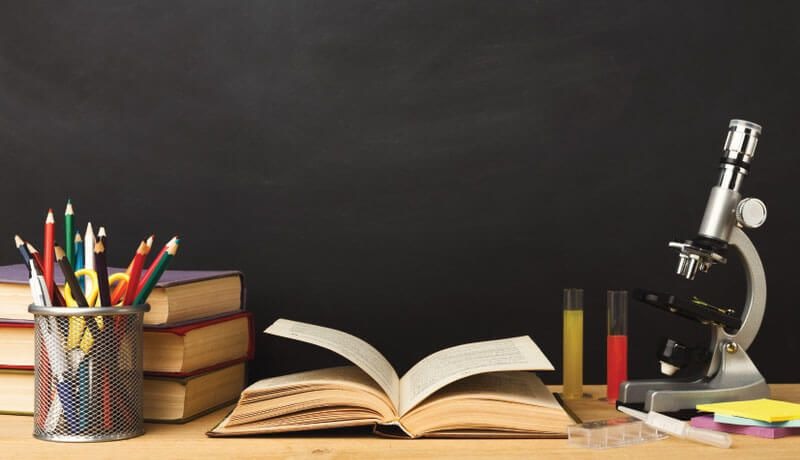

Academic Program
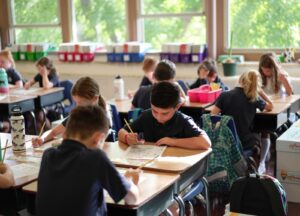
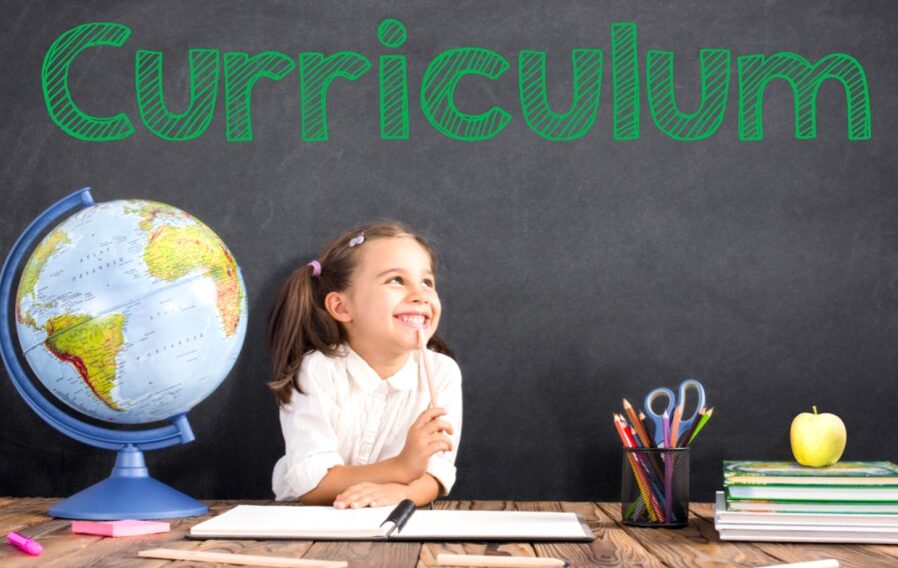
Curriculum
FIIS adheres to the Common Core State Standards (CCSS) for all grades (K-12), ensuring a consistent and rigorous educational framework for teaching English, Language Arts, Math, and Science. The school uses the SAVVAS curriculum, which aligns with best teaching and learning practices, enabling teachers to tailor their lessons to meet the needs of each student.
FIIS follows the Spiral Progression Model, initially focusing on teaching basic facts of a subject without delving into details. As students master these foundational facts, more information is gradually introduced, reinforcing the basics to commit them to long-term memory. Standardized external evaluations, such as the Preliminary Scholastic Aptitude Test (SAT) and the MAP assessment program, are implemented to assess student progres
Areas of Learning

At FIIS school, we offer a comprehensive curriculum for early childhood education to ensure that children are well-prepared for their future academic and personal success. Our curriculum is designed to provide children with a broad range of knowledge and skills, laying a strong foundation for their future progress in school and life. We acknowledge that children learn at different rates and capacities, so our standards cover educational and nurturing aspects for all children in early childhood. Our focus is on fostering positive relationships with the children to make learning an enjoyable choice, helping them develop self-esteem and independence.
The areas of learning in the kindergarten stage include:
- Literacy and phonics.
- Language and communication (English, Arabic, and Japanese) .
- Mathematics.
- Art and design.
- Exploring the world.
- Physical development.
- Personal, social, and emotional development.
- Memorizing the Quran and learning Islamic principles.
For the elementary level, the subjects studied include:
- English, Arabic, Japanese, Mathematics, Science, Scratch & Arduino, Arts, Physical Education, Character Education, and Islamic Studies, in addition to memorizing the Quran.
In Middle School, students begin preparing for college and university. The subjects studied at this stage include:
- English (literature/language), Arabic, Japanese, Mathematics, Chemistry, Physics, Biology, ICT, Arts, Physical Education, Character Education, and Islamic Studies, in addition to memorizing the Quran.
Upon entering high school, students are at a crucial stage of shaping their academic future. This stage is when students decide on their future study track, such as engineering or medicine. To make informed choices, students need to be aware of college requirements, and the school provides assistance and counseling for each student. The stage also prepares students for SAT exams from grade 9 Pre-SAT, and a wide range of subjects will be offered, allowing students to explore their interests and strengths.
Teaching and Learning Guidelines

FIIS Teaching & Learning Strategies
At FIIS, we believe in moving beyond traditional teaching techniques and investing in modern educational tools and methods to develop the teaching process and succeed in competitive domains. We understand that a successful teaching process is not about intensive information storage in a child’s brain but nurturing analytic capabilities, deep thinking, creativity, the ability to activate information, invent solutions, and make informed decisions.
Our school adopts the Constructivist Theory, which emphasizes that people actively construct their own knowledge, and their experiences shape reality. As the adage goes, “Tell me, and I forget. Teach me, and I remember. Involve me, and I learn.” This illustrates the power of constructivist learning theory, a student-centered teaching model used in our classrooms.
At FIIS, we believe in the concept of Active Deep Learner experience, which goes beyond mere entertainment and play. Instead, it emphasizes learning through activities and games. The FIRST-ADLX Framework, a key part of our approach, underscores the importance of active learning to achieve Learning Transfer and enhance the student experience. This approach is not just about incorporating educational games or movement but focuses on the learner's need to acquire new knowledge, which can also be achieved through reading and critical thinking.
While active learning enhances engagement, it often remains superficial. To address this, we integrate active learning with deep learning. Deep Learner eXperience involves learning that permeates the learner's personality, impacting cognitive, physical, and spiritual aspects to achieve sustainable change and lifelong benefits.
Our holistic philosophy ensures a deeply active learning experience throughout the journey, not just during synchronous sessions. Our program utilizes inquiry-based learning, where teachers pose key questions that require critical thinking before delivering content. This method drives learning, builds connections between real-life experiences and educational knowledge, and encourages students to understand the material more deeply.
At FIIS, we are committed to fostering a dynamic and enriching educational environment that prepares our students for lifelong success.
Project-Based Learning

At FIIS, we believe that students differ in intelligence, skills, opportunities, and their ability to leverage these skills according to available opportunities. Each student should be assessed based on their individual skills and potential for improvement. We hold that human skills and capabilities are not predetermined destinies but are skills that can be developed, rather than resigning to an unknown fate.
Our approach includes Project-Based Learning (PBL), a teaching method that brings learning to life by igniting student creativity and curiosity. PBL allows students to explore connections between school and the world around them, tackling real-world problems collaboratively, critically, and creatively. This method supports all our students, fosters a deeper understanding of content, bridges the gap between school and real-world experiences, and develops essential soft skills needed for future success.
To support this approach, FIIS includes four major projects throughout the academic year, each with specific objectives that align with our six main goals:
Technology Integration at FIIS
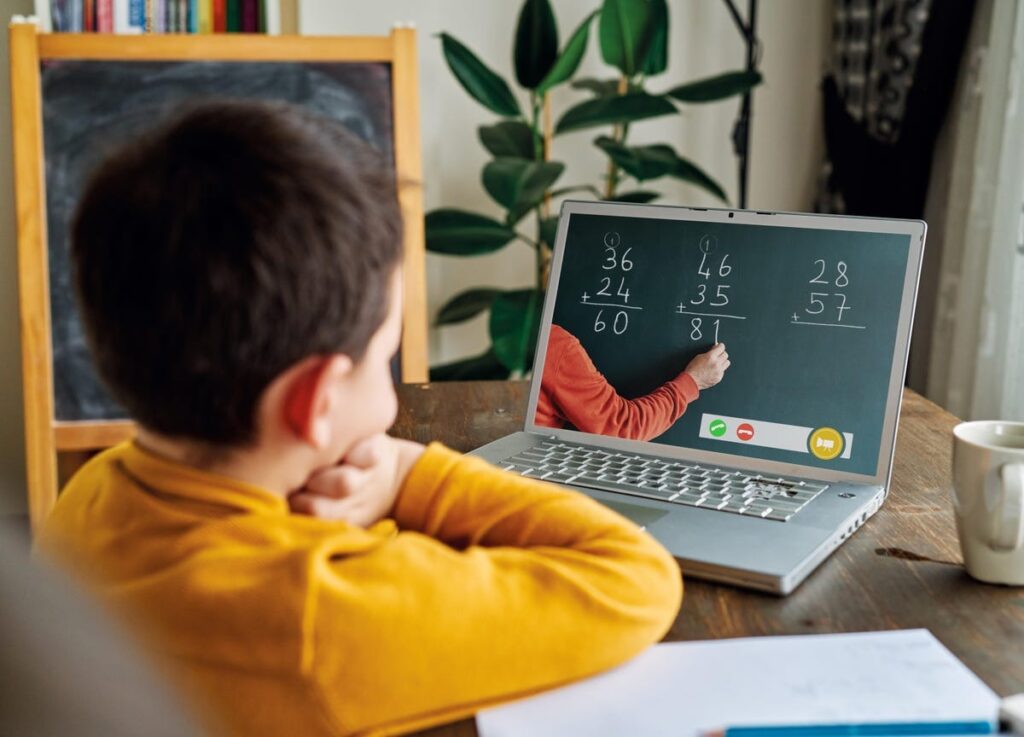
Every student at FIIS has access to an online learning platform, updated daily, to enhance their educational experience.
Secured internet access is provided in designated areas across FIIS to support and facilitate their learning journey.
Information technology resources are utilized by students to engage in meaningful, real-world problem-solving activities.
Interactive projectors are employed as part of practical and active learning strategies, enhancing student engagement and participation.
Parents
Parents have access to the Classera LMS, where they can track their children's academic progress, achievements, behavior, well-being, and attendance.
They are kept informed about FIIS news and events through regular updates and notifications.
Online tools, including Classera and WhatsApp, are available for parents to communicate directly with their children's teachers, ensuring an open line of dialogue.
Teachers
All teachers use technology to review, monitor, and structure student learning and progress effectively.
Technology is systematically integrated into classroom management to streamline educational processes.
Quality software programs, including Classera, are utilized to evaluate student performance and present information in a user-friendly format.
Teachers access up-to-date information and online resources to enhance teaching materials and practices.
Communication with parents is facilitated through both WhatsApp and Classera to maintain strong, ongoing engagement.
Interactive projectors are used extensively, promoting practical and active learning strategies.
Teachers leverage technology to stay informed of the latest successful teaching practices and innovations.
Other Staff
Administrators effectively integrate technology into instructional programs to benefit all students and staff members.
Support staff utilize the latest technology to stay informed about best practices and advancements in their respective fields.
Non-teaching support staff use Classera systems for streamlined registration, admission, and financial management, enhancing operational efficiency.
Community
FIIS publishes significant achievements and initiatives that contribute to society on the FIIS online portal.
The school adheres to all necessary requirements and guidelines to ensure high-quality education.
Every classroom is equipped with an interactive projector and a projector, and every teacher has a laptop connected to the internet via a local area network, supported by a filtering service/firewall.
Internet, intranet, and SMS systems are effectively utilized throughout FIIS.
On-site IT technicians provide support for innovative learning solutions and address any IT-related hardware and software issues.
Assessment

Throughout each quarter, students undergo various formative assessments designed to monitor their ongoing learning and understanding. These assessments include quizzes, projects, presentations, and class participation. They provide immediate feedback on student performance, allowing teachers to adjust instruction and offer targeted support to meet individual learning needs.
Summative Exam
At the end of each quarter, students take a summative exam that evaluates their cumulative knowledge and understanding of the material covered. This exam serves as a comprehensive assessment of students' grasp of the concepts taught throughout the quarter.
Reporting and Communication
Recording of Results
All results from formative assessments and the summative exam are meticulously recorded in the school’s Learning Management System (LMS). This centralized system ensures accurate and up-to-date tracking of each student’s progress and performance.
Feedback and Progress Communication
To keep parents informed, regular feedback on formative assessments is provided. Teachers communicate students' progress frequently, offering insights into their strengths and areas needing improvement. This ongoing dialogue helps parents stay engaged with their child’s academic journey and support their learning at home.
Quarterly Report Cards
At the end of each quarter, students receive a report card that details their grades for both formative and summative assessments. This report card provides a comprehensive overview of their performance for the quarter, highlighting achievements and areas for growth.
Cumulative Reporting
The report card for the fourth quarter is particularly significant as it accumulates all previous quarter results. This final report card offers a holistic view of the student’s academic performance throughout the entire year, summarizing their progress and achievements from all quarters.
This detailed assessment and reporting structure ensures that students receive continuous feedback on their learning, parents are kept informed of their child's progress, and teachers have the necessary data to guide instruction effectively.
Students-Led Conferences
At schools we used to have Parents’ teachers conference as an essential way to communicate about students’ academic progress. we decided to take a new method to do so by students-led conference. It is a great opportunity not only to communicate progress, but also to give students the opportunity to personally demonstrate their progress to their parents. , students will present the knowledge and skills they have acquired during a term from different subjects.
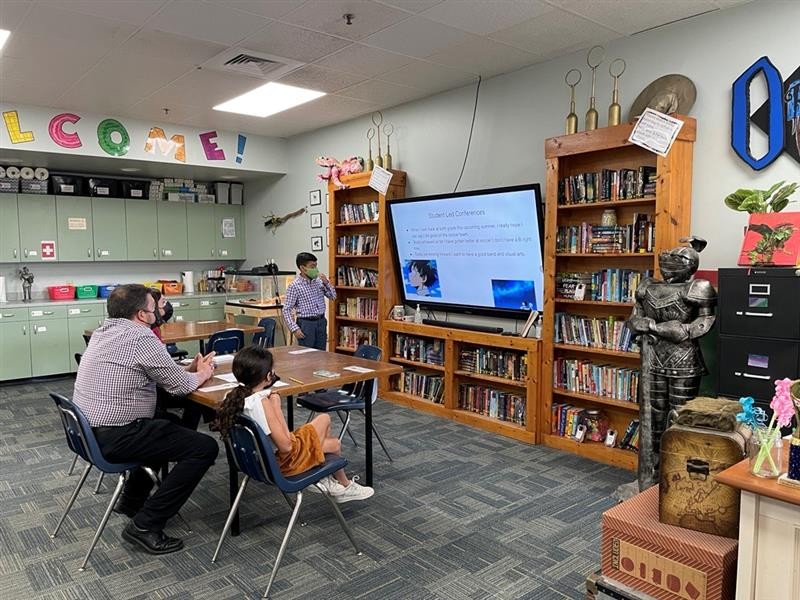

Homework
Homework is given daily or sometimes weekly. The purpose of homework is to emphasis the concepts students have learned in class, practice their skills, challenge their thinking, and prepare them for the next station of learning.
Homework takes anywhere from 30 minutes to 2 hours, depending on the age group. All homework must be completed and submitted on time. Additionally, students are responsible for taking steps towards long-term projects. We encourage parents to get involved in their children’s projects to provide support and guidance and strengthen their relationships.
Activities
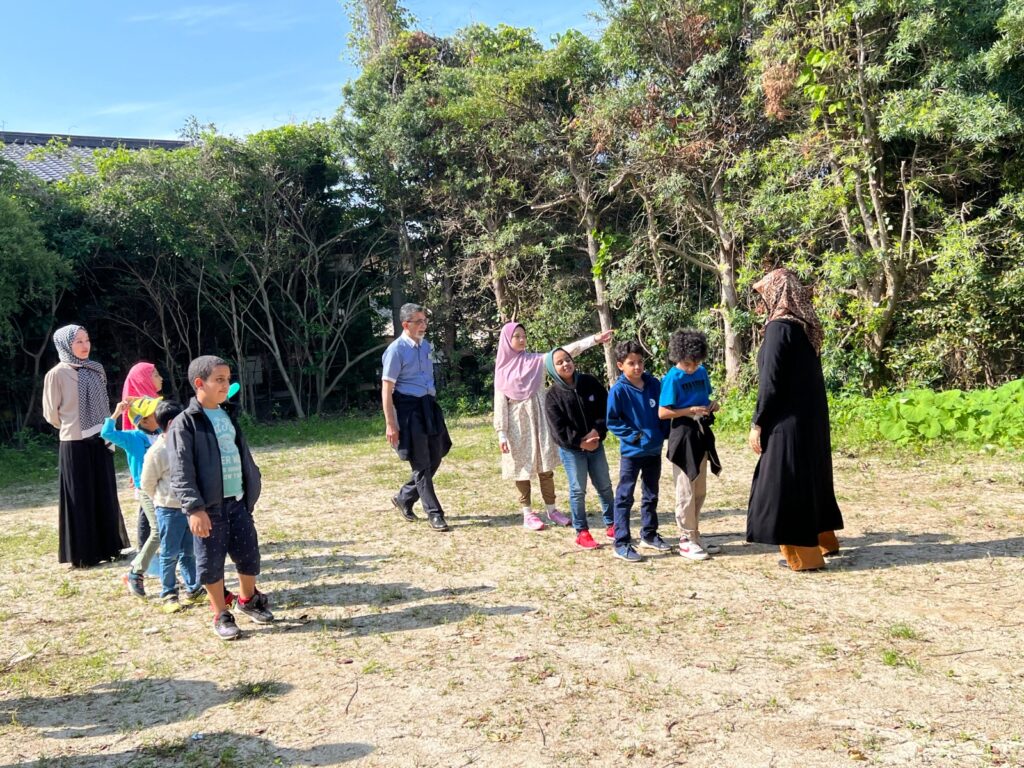
FIIS support students with a wide-range of co-curricular activities that help them to develop and make the most of their potential. These activities are customized to use inquiry-based learning and world-class learning strategies.
Co-Curricular Activities
Teachers provide curricular activities regularly in all subjects that are part of the curriculum of a school. These activities are usually related to the subject matter being taught in the classroom and are designed to help students to be more engaged and enrich their experience during learn. They are good opportunity to apply the material they have been taught and connect it with real life application. Examples of curricular activities include field trips, ...
Talent program
The Talent Time Program is an integral part of school life. Talent time is planned for the end of the week. Talent Programs allow students to learn more about their talents, build knowledge and develop skills in their passion so they can confidently start their careers at a very early age.
During this time, instead of grouping students by grades, they are divided into different areas according to their interests. Teachers will help students discover their talents and guide them to the right area.
The program usually begins with an application call where the student fills out with a parents’ assistant to decide where they would like to join in the Talent Time. Teachers will always be watching students to guide them to the right program.
Talent Time programs include:
- Sports (Swimming, Aikido, Handball, Football, Basketball, Gymnastics, Etc.)
- (Drawing, photography, Etc.).
- Science and Environment Club.
- Technology (Robotics) and Programming.
- Drama.
- Press and Media.
- Vocational Study (Home Economics, Maintenance, Etc.).
